Waltonchain is a blockchain that wants to fix the retail industry. My question is: Is retail actually broken?

This was not the easiest token to learn about. The white paper is long and rambling. I was thankful for this excellent summary of the white paper, courtesy of Samall45 on reddit.
About This Series + Disclaimer
This post is part of a new series where I investigate each of the top 50 coins by marketcap (based on coinmarketcap.com's rankings on October 11, 2017). My goal is to help steem’s userbase become the most knowledgable blockchain community in the world.
Disclaimer: I am not an investment expert and will not be providing investment advice. I will teach you about the top 50 coins, and you can do what you want with that info.
What Does Waltonchain Do?
This blockchain aims to create a system that enhances the Internet of Things. They plan to leverage RFID technology to give items in retail shops unique blockchain IDs which enable those items to be tracked trustlessly and immutably.
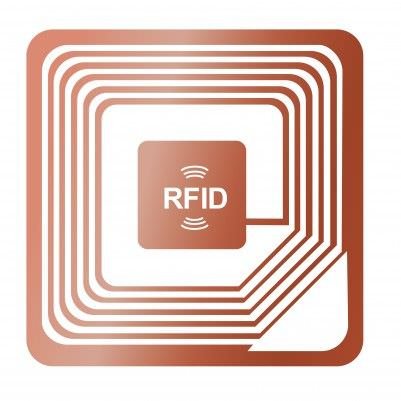
source: ilinkpro.com
They state that this will simplify the process of distributing and selling retail goods. It could make the process of selling products easier and more robust. They make it sound good in theory, but here are my questions:
(1) Will the technology work at scale? (speed + reliability + affordability)
(2) Can retailers/distributors be convinced to try this? Even I found the concept confusing, and I’m deep in the blockchain space.
(3) Is this an improvement over just using the internet in a non-blockchain system?
Let’s look at these three ideas in more detail:
(1) Will the technology work at scale?
I’m skeptical that RFID chips and blockchain can be combined in a way that will work reliably and quickly. We’ve all seen the issues with blockchain protocols so far - bitcoin is too expensive and slow, steem has had lots of front-end stability issues, ethereum/bitcoin have both had controversies surrounding governance…
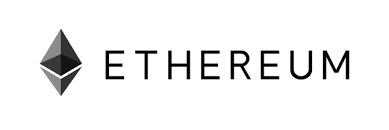
Ethereum suffered a hard fork due to governance issues
It’s one thing for an experimental upstart forum like Steemit to have some issues. But when you are selling products in a store, you can’t afford to have lag time or for your system to go down. I’m afraid that blockchain isn’t ready for this kind of application.
Even if it is possible, the Waltonchain white paper describes a complex system involving many sub-chains and sub-tokens alongside the main Walton token. This leads us to the next point:
(2) Can retailers/distributors be convinced to try this?
I can barely grasp this idea - how will retailers and customers be able to handle it in the near future? It’s hard enough to get retailers to sell products for cryptocurrency. The idea of using a complicated inventory management system involving multiple new technologies, and utilizing a variety of digital currencies (Walton sub-tokens), seems like a huge stretch.
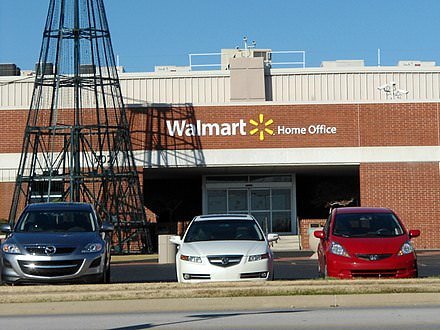
Will Walmart use Walton tokens? I doubt it
It’s so complicated compared to the current model of just keeping inventory by counting products and recording them on a private server. Which leads to point 3:
(3) Is this an improvement over just using the internet in a non-blockchain way?
You can do what we do now without any fancy tokens or protocols, and it works. Why tokenize it?
Blockchain is slower and more burdensome than centralized solutions. It seems like an odd fit for tracking every single item in your inventory, which requires a ton of bandwidth.
Also:
“The team will not only provide secure interfaces for all physical assets to be on the chain, but also provide secure interfaces for human beings, all kinds of animals, creatures to be on the chain, to realize safe and reliable networking, aggregation, digitization of all things, completely change people's way of life and bring more convenience to human life.” (quote from white paper)
…this is the kind of claim that drives me crazy. When you don’t have a product that anybody is using yet, you shouldn’t make gigantic claims like this. Humility is a virtue. And besides, the needs for handling high-volume retail, as opposed to registering your pet or house on the blockchain, are very different… I wouldn’t expect them to use the same protocol.
Token Distribution Model
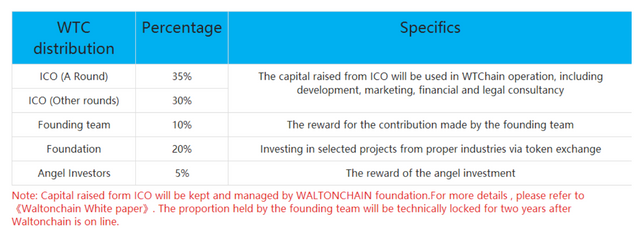
This image comes from here: http://m.waltonchain.org/en/col.jsp?id=107
65% sold in ICOs + 5% for angel investors, 10% for founding team, and 20% more controlled by founders for “investing in selected projects.”
70 million tokens are out so far (https://etherscan.io/token/0xb7cb1c96db6b22b0d3d9536e0108d062bd488f74#balances). An additional 30m will be minted over time to act as mining rewards.
Consensus Model
Waltonchain uses a “Proof of Trusted Stake” model.
This is similar to the regular “Proof of Stake” model which uses the number of tokens and amount of time that they have been held to determine a user’s “stake” in the system. The difference with Waltonchain is that nodes are given a “Reputation” score, much like the steem reputation, based on node performance over time.
I’m not super clear on how this works, but essentially if a node if reliable and handles a bunch of transactions which are confirmed without hassle, it gains a better reputation.
I am not an expert on consensus models, to be honest these things often go over my head, so if anybody wants to chime in with additional context for this be my guest.
The Team
CEO: Bing Mok
“Bing Mo is doctor of Engineering (graduated from Harbin Institute of Technology), Research Professor of Korea University, Distinguished Fellow of Sun Yat - sen University, Internet of Things expert, integrated circuit expert, Senior Member of Chinese Society of Micro-Nano Technology, IEEE Member. Has published more than 20 papers and applied for 18 invention patents. Began his research of BitCoin in 2013, one of the earliest users of btc 38.com and Korea korbit. Served as Technical Director of Korea University to cooperate with Samsung Group to complete the project “Multi sensor data interaction and fusion based on peer to peer network”. Committed to the integration of blockchain technology and Internet of Things to create a real commercialized public chain.”
Description quoted from HERE
Note: Other than CEO, it is hard to determine exactly who does what at Waltonchain.. most of the information is not available in english. Here are two other team member profiles, pulled from the white paper:
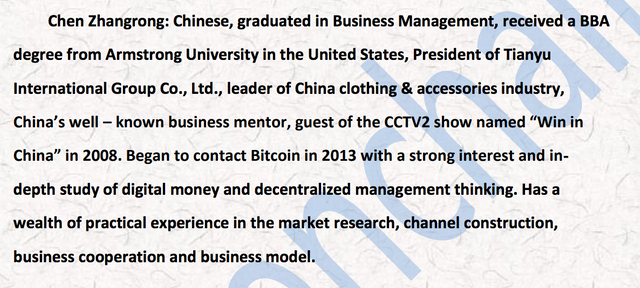
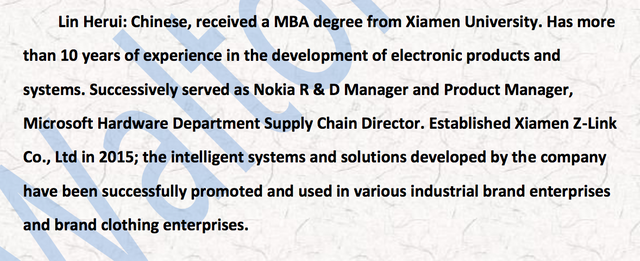
Market History
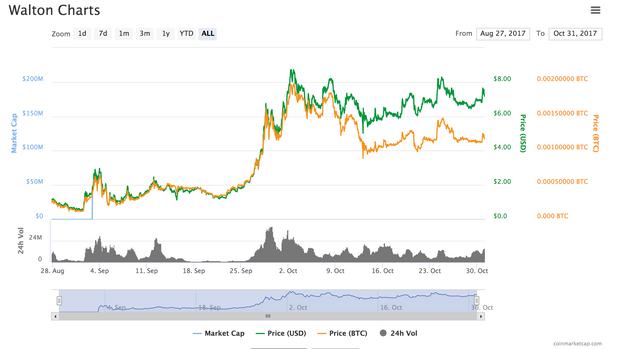
Too young of a token to give much analysis here. All I can say is that the token had a huge spike towards the end of September and has held that value for the month… probably a risky buy right now.
Final Thoughts
I don’t know about this one. On one hand, there is a big team with a lot of experience and they seem to have a big plan. On the other hand, I am skeptical of the entire concept.
I just can’t see a good reason for retailers to equip all of their merchandise with RFID chips and put it all on the blockchain. It seems like a bloated way of handling inventory when the current system works pretty well as it is.
The expense of the system could be an issue too - for items with thin margins, adding RFID chips may not be financially feasible.
Of course, I could be wrong. Perhaps in a few years as blockchain matures this kind of thing will seem more reasonable. I’ll be waiting for a while to watch the Waltonchain evolve and see how blockchain moves forward between now and 2020.
Do you have any experience with Waltonchain? What do you think of it so far?

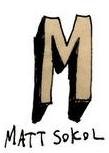
Fun fact: Waltonchain is named after Charles Walton, the inventor of RFID. I'm bullish on Walton because it enables new B2B opportunities. Think about container shipping. I've read it is still done with paper documentation. Imagine if you could load up a container full of items in China and ship it while you sell each item still on the ocean. B2B or B2C, reload it and move it via plane to Europe. Huge efficiency gains.
Downvoting a post can decrease pending rewards and make it less visible. Common reasons:
Submit
That does sound like a good use case... you make a good point. B2B seems a lot more viable than B2C with this technology, which is interesting because the white paper focuses almost exclusively on B2C.
Downvoting a post can decrease pending rewards and make it less visible. Common reasons:
Submit
but with blockchain, the difference in cost and efficiency of B2B vs B2C disappears. everything is integrated. I'm not an expert but there are probably separated systems now based on country, companies, delivery and the end consumer. If you put everything in one system, all becomes end consumer driven.
Downvoting a post can decrease pending rewards and make it less visible. Common reasons:
Submit
Are you sure it disappears? There are many more transactions with B2C than B2B. Imagine selling zillions of t-shirts at wal-mart vs. selling a few thousand "parcels" of goods to a business. Also, RFID chips cost money - I'm not sure if the profit margins for a lot of goods are wide enough to incorporate the added cost of individual RFID chips and blockchain fees
Downvoting a post can decrease pending rewards and make it less visible. Common reasons:
Submit
I would say it disappears or gets extremely integrated and cheap. RFID chips are getting so affordable that they would probably sold at a fraction of a cent. I've read it a long time ago, but here is a chart I just googled: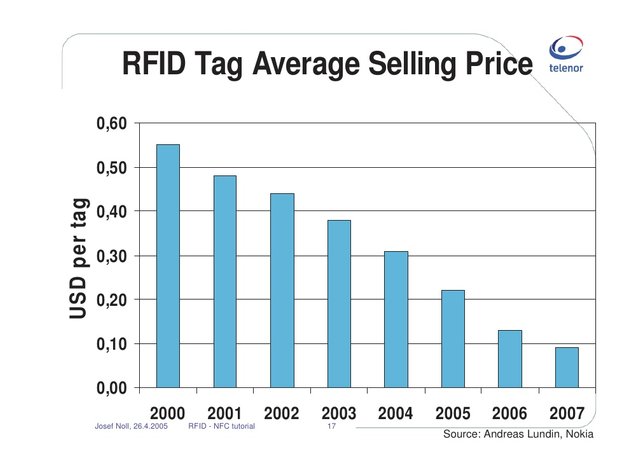
Downvoting a post can decrease pending rewards and make it less visible. Common reasons:
Submit
This is cool. I heard about walton a month or so ago but chose not to buy any. This has a lot of potential which is more than we can say for a lot of other ICOs. More efficient industry is always a good thing as long as the consumer sees it effecting their wallet.
Downvoting a post can decrease pending rewards and make it less visible. Common reasons:
Submit
If they can make retail more efficient it'll be good for sure. Time will tell if they can pull it off....
Downvoting a post can decrease pending rewards and make it less visible. Common reasons:
Submit
Hey @heymattsokol I love this top 50 coin review, great idea. I am with you on Walton I kind of thing they are too early for the industry,plus the white paper is way to complex for me😂. Big companies are not too interested if something is good for their customers only if it helps profit. If it proves a way of saving money there may be some early adoption. I think the team is great so I will keep an eye on proceedings.
Downvoting a post can decrease pending rewards and make it less visible. Common reasons:
Submit
Hi @dukexox, I am glad you like the series! Ya it would be cool if this system benefitted everybody, but I am also a bit skeptical that it will be affordable / make sense for the businesses.
Downvoting a post can decrease pending rewards and make it less visible. Common reasons:
Submit
So you're the guy to go to when all the outside FUD confuses me? And you cover the niche applications popping up all over the chain... This is gonna be excellent for our club on campus.
Downvoting a post can decrease pending rewards and make it less visible. Common reasons:
Submit
Ya you know it, I am the anti-FUD. What's your club?
Downvoting a post can decrease pending rewards and make it less visible. Common reasons:
Submit